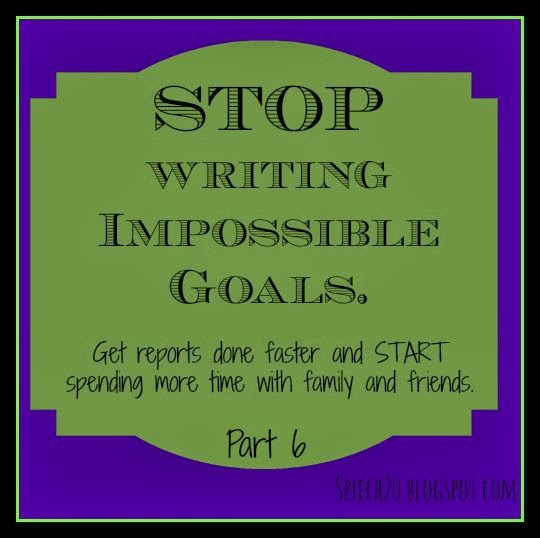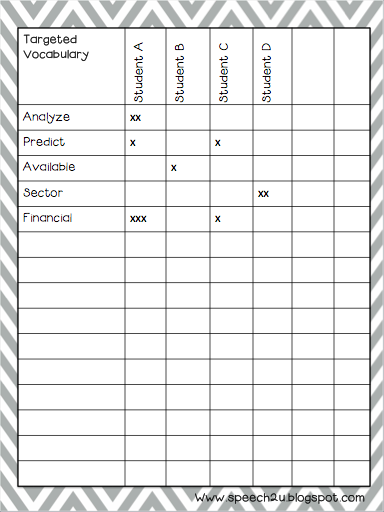My Saturday Soapbox series in November was focused on some of my “goal pet peeves.”
- I don’t know where to start when you write a goal like that.
- It’s an IEP not a grocery list
- Just because they got it wrong on the test doesn’t mean it needs to be a goal.
- Your objectives don’t have to measure 200 things
- Just because they qualified with that score doesn’t mean they should be judged by it.
My last pet peeve is about writing goals to meet grade level criteria.
- Johnny will define grade level vocabulary using category plus function plus 2 descriptors.
- Johnny will improve knowledge of vocabulary be defining 40 7th grade curriculum words by April 2013.
- Johnny will answer questions related to grade level reading material with 80% accuracy.
I’m open to debate on this one. I think this is our way of tying speech therapy goals to the curriculum . We are trying to meet state standards or common core because we are working on grade level vocabulary. It is functional, our students need to understand grade level vocabulary or curriculum vocabulary in order to participate in fully in their classroom.
Here’s my thoughts, most of the students or clients I work with, need to be working on vocabulary that is significantly below grade level. Often times their reading skills are also below “grade level.” If a student really only needed help keeping up with their grade level material, then maybe a tutor would be more appropriate then a speech language pathologist.
I’ve written a lot of goals for defining vocabulary. Now, I’m starting to think that this is a better goal to write when working on sequencing or oral narratives. I love programs like the Expanding Expression Tool which helps to build a framework for the student to explain or define vocabulary/events. I think it helps a lot .
Here’s what I’m wondering: Is being able to define vocabulary a good measure of a student’s vocabulary abilities? Does it predict whether or not a student is able to use the word appropriately and comprehend the word in the text? I don’t have an answer for this. I’d love to hear your opinions.
Jenn from Crazy Speech World has recommended and written about the book Bringing Words to Life. I’ve started reading it and really like how they explain teaching vocabulary. There are a lot of good examples and methods for making sure the student really understands the meanings of the word.
This book was also my first experience with Tiered vocabulary instruction. Tiered One words are basic vocabulary vocabulary that we would expect students in a mainstreamed setting to know (house, run, find.) Tier 2 words are words that are more academic in nature but are used in a variety of classrooms (ex. analyze, predict.) Tier 3 words are words that are specific to one class or area (ex. precipitation, geometry). Since I’ve read part of the book, I’m rethinking some of these “curriculum” vocabulary words. I want to start focusing more on Tier 2 or “high frequency” vocabulary. The great thing about the internet is that you can do a search to get a lot of different lists to get you started. This would be a fantastic resource-especially if you are pushing in to classrooms. I could really see this technique being successful with a lot of students. You would just need to get a copy of the textbook and pick out 5-8 words to “preteach” during your lesson.
Is anyone else a half a book reader? I’m a SLP book hoarder. I usually start out and get really excited about the book and then once I have the gist of it, I put it on my bookshelf and start the next book. I had a counselor once who asked if I had ADHD, I don’t think so, but the half-read books on my bookshelf may suggest differently.
Based on the information in this book, I think a more effective vocabulary goal might be that the student is able to USE the vocabulary word within several appropriate contexts. To me this is really demonstrating that the student is understanding the vocabulary. I want to be careful not to write a goal like “Given a vocabulary word, Johnny will use it in a sentence with 80% accuracy.” I also want to make sure that it isn’t a nightmare to chart on so I may want to work from a closed set of vocabulary words. (ex. given 40 words.) I also want to make sure that it’s where I’m getting my closed set of words from-sometimes that 40 words can be really confusing-especially if the student transfers.
So maybe my goal would look like:
Given weekly instruction targeting 5 high frequency vocabulary words taken from classroom texts, Johnny will demonstrate the ability to use 60% of taught vocabulary appropriately in sentence level productions over three sessions.
This is another goal that may need some work. But I can tell that I am going to be teaching 5 new words per week. I know where I am getting the vocabulary words are coming from. I have some flexibility with what vocabulary I choose so I can pick vocabulary that is appropriate to the child. I can keep a running list and check words off as I hear them used appropriately within our activities. When progress reports are due, I can tally these up and get a figure. Assuming that the school year is 36 weeks, I’d be working on 180 vocabulary words in the year or 45 words per quarter. I might make up a sheet like:
What do you think? Is writing goals to work on grade level vocabulary at your school? I’m taking a break from goal writing for December. In 2014, I’m planning on going a little more in depth on some of my ideas for different goal areas. I’m thinking about picking one topic per month. Anything you find you struggle with? If you liked this post, please take time to comment or share with others on Pinterest or Facebook.




I love your “Soapbox Saturday” feature!
When I write an objective for using vocabulary, I often will write it so that they will use the word in a sentence. I do think that’s the best way to know if they know the meaning. While reading this post, I thought back to some language kids that I have. When I have them use the vocabulary words in a sentence, it’s pretty obvious if they at least have some kind of clue as to the meaning. If they don’t, they’ll use the noun as a verb or adjective. When I write the objective, I’ll put something general like “classroom vocabulary” since they aren’t on grade level. I like your idea of focusing on 5 words/week. Thanks for the idea (and the wording on the objective!)!
Oh girl, preach on! I hate when I get goals that says that so and so will define such and such number of words or that so and so will learn curriculum vocabulary. WHAT? How do you even measure that? The research shows that teaching students words in isolation (i.e. flashcards, dictionary activities, etc) does nothing and instruction needs to be embedded and authentic…strategies used in Bringing Words To Life are the best ways to teach students words and to really broaden their vocabulary knowledge.
P.S. Thanks for the shout out
You have made some excellent points and it is something I struggle woth often. Are you familiar with Montgomery Assessment of Vocabulary Acquistion? After you administer the test you can go to Super Duper website and determine percentage of tier 1-3 words the student identified correctly.
Debra
Charlotte NC
I appreciate your candid remarks on goal writing! When I get IEPs from other schools I often wonder what they could’ve possibly been thinking and is it me who is out of touch with reality or them. I have the added pleasure this year of waiting/expecting the state to evaluate our district’s IEPs and am very concerned that mine will not be in compliance. I would love to see your ideas on goals for the areas that we have to address regularly. Thanks for tackling the topic of goal writing! I’ll be waiting to read more.
I recently attended a vocabulary conference by Patricia Sanford which was really awesome. She discussed Bloom’s levels in regards to vocabulary. There’s the Knowledge level (being able to define), Comprehension (understanding the word and being able to use synonyms/antonyms), Application (using the words in sentences/stories), Analyze (being able to identify relevant features), Evaluate (rank and be able to decide if it’s used correctly/incorrectly), and Synthesize (using the word creatively). I thought that understanding these levels helps you know at what level your students are at regarding their vocabulary. Grade-level or not.
Some interesting ideas.
I am so sick of crazy goals!
Sharing ideas can help us all…thanks
I really love reading your soapboxes. Please keep them coming!!!
Interesting post – I am sufficiently intrigued to review the previous entries on this subject. Goals, Schmoals! It gets exhausting having all that brain power sucked out while staring at the screen trying to perfect “that one goal”! Thanks for your perspective.